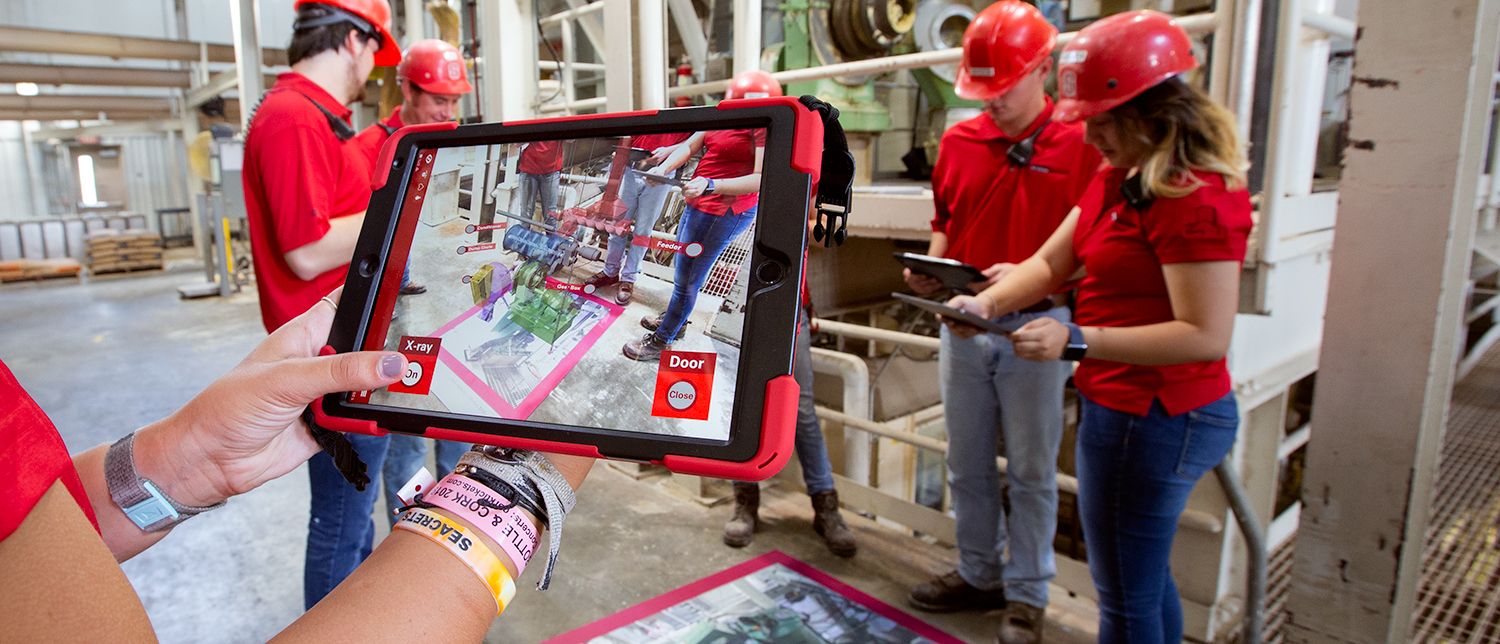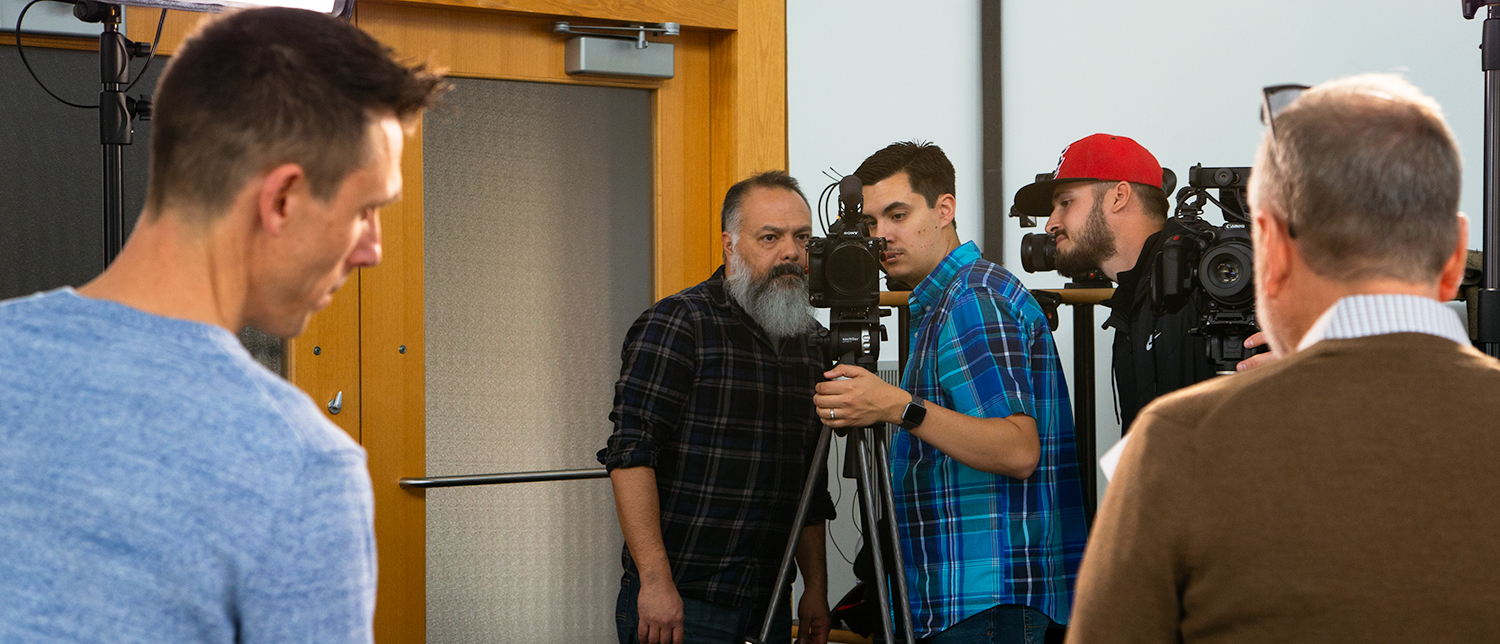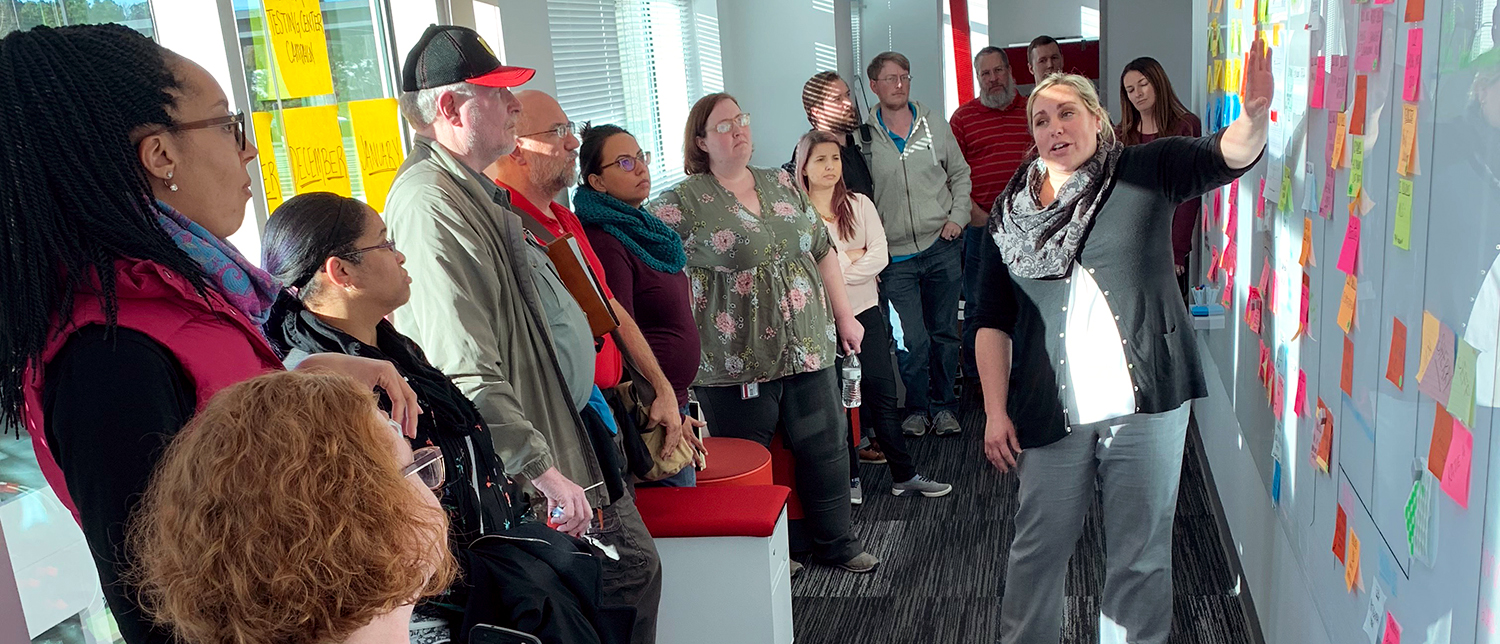As we refine our services at DELTA, we use them to make a positive impact. In working with partners around the university, from faculty and committees to colleges and administrative units, we’ve established ourselves as a leader in collaboration and innovation. Our online and distance education programs bring NC State’s education into new communities across the country and abroad.
Explore each section to read specific stories that point to our progress in reaching our strategic goals.

DELTA staff members teamed up with Associate Teaching Professor Olga Kleiankina on a DELTA Grant to create an interactive piano web application to replace the standard method book. The application includes a variety of custom elements including responsive formatting and annotating capabilities.
DELTA Goal 1: Leverage learning technologies to improve student success.
[Aligns with University Goals 1 and 2]
- Awarded 26 DELTA Grants to NC State faculty which impacted more than 6,000 students.
- Supported first Rapid Design Grants awarded to faculty to design and develop quality, best-practice-based online and distance education courses in 12 to 16 weeks.
- Provided evaluation and assessment support for 16 course redesign projects and one tool design project to determine impact on student success. Post-redesign data show students maintain a high interest and engagement with the subject, course activities and materials. Students also reported positive receptions of their learning and their potential for success in subsequent courses.
- Supported 12 faculty in the Online Course Improvement Program (OCIP) resulting in 12 courses earning official Quality Matters course certification.
- Participated in a strategic planning meeting to create the UNC System Quality Matters Council. Two DELTA staff members hold leadership roles on the council.
- Increased quality assurance processes across the university by providing 11 workshops that incorporated Quality Matters standards resulting in 88 attendees.
- Supported five Faculty Fellows in leading 14 workshops with 146 unique enrollments. Faculty Fellows collaborated with DELTA to share best practices and provide invaluable feedback and support by presenting at conferences, writing DELTA News articles, facilitating Summer Shorts sessions, promoting the DELTA Grants program and serving on the pilot for the learning analytics project.
- Offered 166 teaching with technology workshops with 963 attendees. Topics included introductory and advanced workshops for NC State’s learning technologies such as WolfWare, Moodle, Zoom and Top Hat, how to apply the Quality Matters rubric, tips for increasing student engagement, and more best-practice-based trainings.
- Provided 153 instructional consultations with instructors and staff members from 17 different colleges, units and offices across campus.
- Offered the 2018 Summer Shorts in Instructional Technologies program which garnered 88 unique attendees from across the university. The second annual DELTA-Con was held as part of Summer Shorts in August 2018. In May 2019, DELTA-Con was held as a stand-alone event which brought representatives from 15 higher education institutions together to network and share teaching with technology best practices.
- Continued work and planned future development on the Learning Analytics Project (LAP) which leverages technology to predict how well a student might perform in a course based on individual activity. DELTA collaborated with a pilot group to receive feedback about the LAP dashboard.
- Engaged with an external vendor to begin initial phases of designing a syllabus tool based on feedback from the 2018 NC State Learning Technologies All Faculty Survey.
- Completed an initial study focused on understanding differences in student success between face-to-face and online course formats at NC State.
- Partnered with NC State Libraries and Bookstores to research open educational resources including the Top Hat Marketplace content creation tool. The Top Hat project supported 10 instructors across eight courses with an estimated realistic savings of $100,970 per year.

This augmented reality application is taking students inside the NC State Feed Mill Education Unit’s machines and processes like never before. Created through a DELTA Grant with Marissa Herchler and Adam Fahrenholz, the augmented reality application will transform the way students learn about the feed mill.
DELTA Goal 2: Lead the research, implementation and support of innovative, scalable and reliable learning technologies and methodologies.
[Aligns with University Goals 1 and 3]
- Implemented the enterprise-level web communications platform, Zoom, which provides reliable video, audio and chat functionality for online communication needs.
- Created training and support resources for Zoom as well as completed work on branding, customization and further integration with the WolfWare suite of tools.
- Replaced the WolfWare Email tool with WolfWare Google Groups to allow faculty more flexibility in communicating and sharing resources with their students.
- Integrated Mediasite with Moodle to easily link to Mediasite content from Moodle to streamline the process for faculty and students.
- Added a Google Course Kit integration to Moodle to allow faculty to securely use Google Docs, Sheets and Slides within Moodle.
- Collaborated with campus partners to add new features to Moodle such as integrating Lynda.com (now LinkedInLearning), Turnitin and more.
- Developed and contributed 15 ideas and code snippets to the Moodle community which resulted in closing/resolving eight of the issues.
- Facilitated 50 presentations at 29 different conferences/events across the nation to share best practices and attended multiple additional conferences as participants to keep abreast of innovative technology trends.
- Completed an all-faculty survey to gather feedback about how NC State’s enterprise learning technologies are meeting the instructional needs of its users. Faculty are mostly satisfied with NC State’s enterprise learning technologies. DELTA gathered suggestions for adding tools and support resources.
- Supported seven academic courses in the exploration of mobile applications and virtual reality.
- Refined virtual reality hardware, post-production and graphic integration workflow for projects.
- Developed and implemented DELTA’s first augmented reality (AR) products. For Feed Mill Management, the team created an augmented facilities tour, and in Graphic Design Theory and Practice, augmented reality was used to enhance an existing graphic design theory textbook.
- Increased focus on classroom and distance learning distribution solutions for virtual reality experiences.
- Delivered 167 instructional videos for 39 unique projects. Examples of videos include traditional story-based learning, how-to videos, 360° virtual and augmented reality projects, underwater videography and drone photography.
- Continued to grow the usage of Top Hat with the number of active courses nearly doubling from 285 in 2018 to 487 in 2019. The number of student accounts increased by 67% from 11,498 in 2018 to 19,244 in 2019.
- Used Mediasite to provide content capture for distance education courses with content watched for more than 392,947 hours from nearly 49,000 unique users from 102,000 IP addresses.
- Updated the DELTA classroom infrastructure to install an IP workflow that seamlessly evolves and scales to meet future classroom support needs.
- Updated the DELTA mini studios to standardize the technology, lighting and furniture at both facilities.
- Improved DELTA’s Central Control Room (CCR) operations center to optimize IP transmission which resulted in a future-ready CCR operations center that transports video, audio and timing signals in a converged environment to and from nine DELTA classrooms. These improvements add to DELTA’s scalable, flexible and real-time infrastructure.
- Refreshed the hardware blade servers and expanded our storage capacity to meet continually increasing storage needs.
- Partnered with the Training and Development program to develop a competency-based framework for the program. DELTA teams are finalizing the development and release of a Moodle Competencies system to meet the needs of the instructors while maintaining security, performance and integrity.
- Resolved 5,509 support tickets through ServiceNow — 4,290 by the LearnTech help desk and 1,219 by the Mediasite help desk.
7,498 Enrollments
in WolfWare Outreach
DELTA Goal 3: Leverage learning technologies to support Outreach and Engagement activities.
[Aligns with University Goals 4 and 5]
- Increased WolfWare Outreach enrollments by 24% to 7,498.
- Lowered the WolfWare Outreach hosting charge from $9.37 to $7.93.
- Recruited 13 new faculty to engage in WolfWare Outreach, resulting in 18 new non-credit, online, fee-based programs.
- Hosted 237 WolfWare Outreach courses from 118 instructors in 34 programs across the university.
- Developed and published a pricing and revenue estimator for REPORTER and WolfWare Outreach to help clients estimate their costs and desired revenue.
- Supported the WolfWare Internal Training and Development team in working with the Office of Information Technology to establish the mandatory Data Security Training module completed by every NC State employee.
- Increased WolfWare Internal Training and Development’s partners from 6 to 11 campus departments and divisions. The team provides partners with a variety of training resources to create non-credit, no-fee courses and projects.
- Completed 15 environmental scans, feasibility studies, competitive trends analysis projects for potential WolfWare Outreach programs.
- Updated REPORTER’s mobile registration and payment processing to improve user experience.
- Created a WolfWare Outreach Coordinator training and resource course to help coordinators link WolfWare Outreach tools and REPORTER.
- Collaborated with the Identity Management services team to name the REPORTER guest-user system, NC State Brickyard Login.

Arthur Earnest (left) and Michael Castro (right) shoot video of Ryan Hargrove and Ignacio Bunster-Ossa discussing climate change and design for the Doctor of Design program. DELTA continued partnering with the College of Design this year to support the program.
DELTA Goal 4: Support the creation and delivery of programs and courses that meet strategic enrollment planning and workforce needs for North Carolina and beyond.
[Aligns with University Goals 1 and 5]
- Supported 104 degree, certificate and teacher licensure programs in a variety of disciplines, with 20,416 on-campus and distance students enrolled in 1,985 courses and sections taught by 852 NC State faculty.
- Provided funding for a new Undergraduate Certificate in Essentials of Business.
- Funded the development of a Graduate Certificate in Renewable Energy Assessment and Development.
- Continued partnering with the College of Design to support the Doctor of Design (D.Des.) program, the only professional doctoral program in the country that offers blended learning in design research to meet the needs of practicing designers. The D.Des. program officially launched in fall 2018 with its first cohort of students.
- Participated in student recruitment at eight military education fairs and events.
- Waived Non-Degree Studies (NDS) application fees for military applicants to streamline enrollment processes and foster student retention.
- Began work to enhance the online and distance education website to integrate the Burning Glass Labor Insight and Career Insight platforms to support a career-focused student recruitment strategy.
- Launched the EAB Marketing Automation Student Recruitment Pilot with 16 programs in Engineering Online and three programs in the College of Agricultural and Life Sciences to identify prospective audiences seeking online educational programs.
- Conducted and implemented 48 environmental scans, feasibility studies, competitive and trend analysis projects.
- Developed and launched multiple brand awareness campaigns of NC State Online and Distance Education on Facebook and LinkedIn. Reached 289,634 users on Facebook and earned 120,612 organic impressions on Facebook and 5,076 organic impressions on LinkedIn. Reached 1,997,235 users and earned 3,269,510 impressions through paid Facebook campaigns.
- Increased online and distance education total social audience by 10.4%. Facebook grew 3.6%, Twitter grew 23%, Instagram grew 38.8% and LinkedIn grew 43%.

Lead Project Manager Laurie Gyalog (right) gives an overview of DELTA’s Kanban boards to attendees of the Project Management and Agile Community (PMAC) meeting. Gyalog founded PMAC to share project management and agile best practices and increase collaboration and efficiency across campus.
DELTA Goal 5: Promote collaboration, transparency and efficiency in DELTA operations, programs and services.
[University Goal 4]
- Proctored 94,233 exams with a total of 23,169 students served locally and remotely. DELTA Testing Services implemented an appointment-only exam system to adapt to the unprecedented demand for testing.
- Continued investigation of a location for an expanded DELTA Test Center to meet the current and projected growth in testing.
- Led efforts to introduce project management and Agile practices to support the NC State community in increasing collaboration and transparency.
- Founded the Project Management and Agile Community (PMAC) for project management professional development and to serve the NC State community by sharing best practices, trips and tricks of the trade and emerging trends.
- Presented project management sessions at both the IT Community Event and the HR Professionals conference as well as facilitated a required Agile and project management training at NC State central HR.
- Provided project coordination support for more than 100 projects across all teams and units in DELTA including key enterprise-level tool implementations.
- Continued usage of TeamworkPM to track and manage projects with more than 400 milestones and 1,100 tasks completed during 2018-2019.
- Created and facilitated professional development sessions for all DELTA staff members on topics such as communication, leadership, task management and collaboration.
- Streamlined the marketing and communications review and approval process by implementing InMotion Now for routing and approvals, which has reduced errors and increased efficiency.
- Increased marketing and communication efforts to build awareness of DELTA services and offerings for faculty through a monthly newsletter, DELTA News and social media.
- Leveraged NC State and campus partners’ communication channels including the Bulletin, the Office of Faculty Development and the Office of the Executive Vice Chancellor and Provost’s newsletters to share and repurpose content. DELTA was mentioned more than 20 times in the NC State Bulletin which reaches all faculty and staff.
- Launched a new version of the DELTA Knowledge Base using ServiceNow with continued development of content to provide accurate and up-to-date instructional technology support. DELTA Knowledge Base articles were viewed 811 times.
- Maximized use of ServiceNow across DELTA for help tickets, reservation requests for DELTA classrooms and cross-team collaboration when solving Tier 3 help calls.
- Updated the Planning and Assessment webpage to provide easy access to the team’s research and increase visibility of reports and results.
- Completed redesigns and updates of DELTA spaces including cube and furniture reconfiguration, ergonomic desk options and more to match business needs and further cross-team collaboration.
- Planned, developed and implemented a DELTA business continuity and safety plan which includes annual goals and provides solutions for challenges.
- Created documentation resources including user guides for new tools and updated existing procedural documentation into new standard templates.
- Held 11 wellness activities to positively impact a healthy work culture with more than 100 participants across the events.
- Received the Gold Well Wolfpack Certification for excellence in categories such as active workplace, nutrition, emotional wellbeing and culture of wellness.